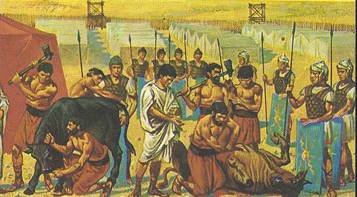IN 29 B.C. the gates of war were closed. Rome was at peace. Senators and the people of the mob-men who had hated and fought each other through long, bitter years — stood side by side in the Forum while the great doors of the temple of Janus were slowly pushed shut. That had happened only twice before in the history of the city. The crowd in the Forum cheered the peace and they cheered Octavius, their new ruler. He was no longer the young man who had rushed to Rome after the murder of his uncle, Caesar. Seventeen years …
Read More »Tag Archives: Sappho
The Greek Way of Life 700 B. C. – 343 B. C.
In the first years of Spartan peace, Greece was filled with wandering soldiers. Their little cities needed them no more. The new governments, which Spartans appointed, looked on them as men who might make trouble and were quick to get rid of them. Homeless and with no way to earn a living, the old campaigners roamed from place to place. They became soldiers of fortune, men who fought for any general or city that offered pay and three meals a day. In 401 B. C., ten thousand of them hired themselves out to Cyrus, a prince of Persia, who hoped …
Read More »
